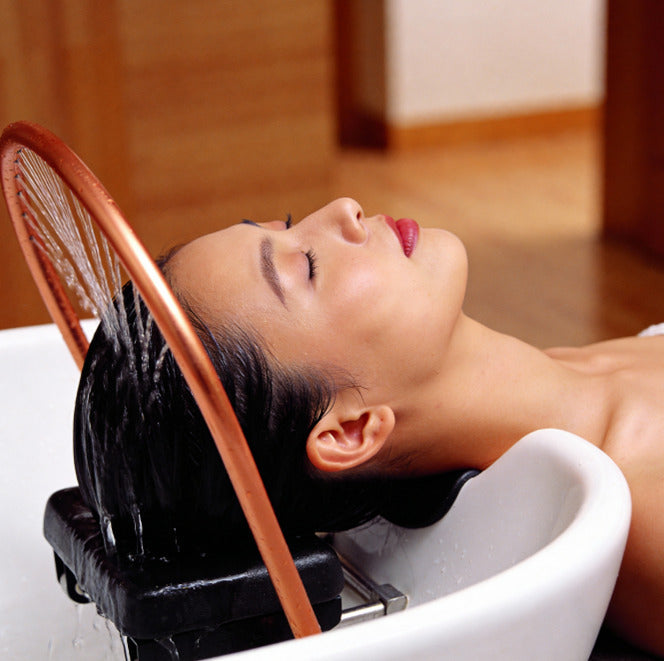Hair Oil and Hair Extensions: Everything You Need to Know
by HEATHER COLLIER / MAY 24, 2024
Reading Time: 7 Minutes
Index
Hair oil and hair extensions may seem like an unlikely combination, but the truth is, hair oil can not only massively improve the quality of your extensions, but your natural tresses too. Unlike our natural locks, extensions don’t get as much oil and nutrients that they need in order to look shiny, healthy and full of life. One of the best ways to keep them in good condition is to pamper them with natural oils, just like you would with your own hair.
In this guide, we’ll explore various types of hair oils, their benefits and drawbacks, appropriate application methods, and tips for avoiding common pitfalls.
Can You Use Hair Oil with Extensions?

The answer is yes! However, although hair oil can be a gamechanger, not all oils are suitable for use with extensions, and knowing the right way to use these oils can make a significant difference.
Understanding Different Types of Hair Oil
Coconut Oil

Coconut oil is known for moisturising and repairing damaged tresses. It can also prevent hair loss and could aid in thickening your strands. If you want your extensions softer, coconut oil can give you that in just a few uses! This form of hair oil maintains the moisture balance without causing excess buildup. When applying, leave it to soak in your locks for up to 30 minutes. Rinse thoroughly afterwards since this oil is considered thicker than most.
Argan Oil

Argan oil is a lightweight, flexible oil also sold as ‘Moroccan oil’, and is a highly popular and sought after ingredient often found in a wide variety of beauty products, not just haircare. One of the greatest advantages of argan oil is it lacks a greasy texture like other oils have, meaning it’s perfect for everyday use. If used regularly, you can say goodbye to frizzy, dry locks for good thanks to its miracle-working antioxidants, vitamins and fatty acids, all of which contribute to ridding you of static, split ends and hair breakage.
To learn more of the benefits of this highly effective hair oil, cast your eyes over to our blog: Benefits of Argan Oil For Hair: How To Use It.
Jojoba Oil

When it comes to preventing hair loss, jojoba oil is your new best friend! Known to strengthen hair follicles, it’s wax-like texture is a great treatment for replenishing dry, frizzy hair. It doesn't penetrate the hair strand directly and instead stays on the surface, sealing the moisture in your tresses and filling in cracks on the surface of the hair which makes it softer, nicer to the touch and much shinier. For the curly haired girls, you’ll be pleased to know it works best with frizzier hair textures or tight curls.
Almond Oil

Almond oil for hair extensions is a great solution to treating your clip ins or permanents, but can also be used on natural hair as a treatment for flaky scalp and scalp psoriasis. Rubbing a small amount of almond oil directly on your scalp increases blood flow to the area and introduces powerful antioxidants to the skin on your head. However, it’s best to avoid rubbing the scalp if wearing permanent extensions, as this can cause them to come loose. If you’re wanting to increase your extensions’ shine and softness, pay extra attention to the ends of your hair. Massage the oil into the end of the hair and leave the oil on your hair after styling it.
Rosemary Oil

Rosemary oil has been known to have therapeutic benefits and is often used for medicinal purposes. When it comes to your hair, it can act as the ideal home remedy for giving your locks a new lease of life.
If you have temporary extensions like clip ins that do not involve any form of adhesive, you can safely use rosemary oil on your natural hair and scalp. However, if your extensions are bonded with glue or tape, it is best to avoid applying the oil directly to the attachment points. Rosemary oil has also been rumoured to promote hair growth, and although much of this is based on anecdotal evidence and countless videos on TikTok, it does in fact appear to be true, although research is still underway.
Generally speaking, it’s safe to say that rosemary oil can be used on all hair types, including colour-treated hair. As with any hair oil, if your tresses are naturally thin, please be aware that rosemary oil might be prone to weighing your hair down.
For all the secrets to using rosemary oil, check out our blog Is Rosemary Oil Actually Good For You? as our experts debunk whether it’s another viral hair myth or not.
Hair Oils To Avoid Using on Extensions
- Mineral Oil: Mineral oil can create a heavy, greasy buildup on hair extensions, making them look limp and dirty. It can also make it difficult for the hair to breathe, leading to potential damage and a shorter lifespan for the extensions.
- Castor Oil: While castor oil is beneficial for natural hair growth, it is very thick and sticky, which can weigh down hair extensions and make them difficult to manage. The residue can attract dirt and dust, reducing the natural look of the extensions.
- Olive Oil: Another heavy oil, olive oil can leave a greasy film on hair extensions. It can attract dirt and debris, which can result in a less-than-natural appearance and potentially damage the hair fibres.
Pros and Cons

Why You’ll Love Hair Oil:
- Shine and Gloss: Hair oils, especially argan oil, can give your extensions a beautiful, shiny finish, making them look just as radiant as your natural hair.
- Frizz Control: Say goodbye to frizz! Oils like argan and jojoba help tame those pesky fly-aways, keeping your extensions smooth and sleek.
- Moisture Boost: Coconut oil is fantastic for adding a deep moisture boost, preventing dryness and brittleness in both extensions and natural hair.
- Nourishment: Packed with vitamins and antioxidants, oils such as argan oil nourish your hair from root to tip, promoting overall hair health.
- Softness: Regular use of the right oils can make your extensions feel super soft and silky, enhancing their natural texture and movement.
- Scalp Health: Some hair oils like jojoba mimic the natural oils of your scalp, keeping it hydrated and healthy without clogging pores.
Keep In Mind:
Like any haircare product, hair oil also has its disadvantages. Luckily, the cons of using hair oil are fairly slim, particularly if you use yours in the correct way.
- Build-up Risk: Heavy oils like castor and olive oil can cause buildup, making your extensions look greasy and weighed down.
- Extension Slippage: Oils applied too close to the attachment points can cause extensions to slip or become loose.
- Expense: High-quality oils like argan oil can be on the pricier side, but they’re worth every penny for the benefits they bring!
- Overuse Issues: Using too much oil can lead to greasy-looking hair and clogged pores on the scalp, potentially causing dandruff and other scalp issues if not applied correctly.
How To Use Hair Oil

Less is more, especially when it comes to oils and serums! Excessive amounts of oil can cause extension slippage, meaning your extensions are more likely to be less secure and slip out of place, causing them to detach or no longer be aligned with your scalp in the desired way. Depending on your hair, skin type or sensitivity, overusing oil can also cause scalp irritation instead of improving it.
Hair oil is nature’s answer to the perfect moisturiser, as it can also be applied to wet hair during the drying process, adding an extra layer of protection and leaving it feeling silky and smooth. For a more luxurious treatment, you can add natural oils to your conditioner or hair mask.
How To Fix Over-Oily Hair Extensions

Before you begin applying hair oil to your extensions, there’s a few things you may have to consider. Firstly, do you have naturally greasy hair? If you find that your hair tends to get greasy fairly quickly, then it’s important to wash your hair regularly to prevent any further risk of slippage. When conditioning, focus on the ends and mid-lengths and be sure to avoid applying to your roots, as this will only add to a greasier look and feel. If you are a regular user of hair oils, make sure to shampoo your hair twice when washing to prevent any build up.
Conclusion
Understanding the right oils to use and how to apply them can greatly enhance the longevity and appearance of your hair extensions while keeping your natural hair healthy. Remember to use oils sparingly and always focus on the ends rather than the roots to avoid any issues.
Looking for flawless, salon-worthy hair without breaking the bank? At Cliphair, we’ve got you covered with luxurious clip in hair extensions for quick transformations and permanent hair extensions for long-lasting glam. Extensions require special care and maintenance to preserve their quality, which is why we have all the top-notch hydrating haircare products needed to keep your style on point.
Need the perfect shade? Browse our full range of human hair extensions in over 70 rich, silky shades or check out our FREE Express Color Match Service to ensure a seamless blend every time.






